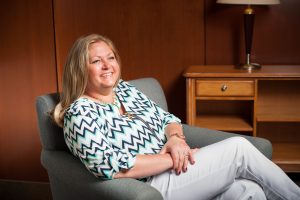One Woman’s Journey with Breast Cancer Becomes a Passion for Helping Others
Writer / IU Health West Hospital
Photographer / Esther Boston
 Avon resident Ginger Shirrell remembers the exact moment her doctor called with the results of her very first mammogram.
Avon resident Ginger Shirrell remembers the exact moment her doctor called with the results of her very first mammogram.
Shirrell was 42, in good health and had no family history of breast cancer. She wasn’t worried. She’d faced cancer as a teen. She wasn’t going to get it twice. But when the call came, she heard the words she hadn’t even considered fearing — she had breast cancer.
A routine mammogram revealed a small tumor in her breast. After a biopsy, her breast care team at Indiana University Health West Hospital determined that she had Stage II DCIS (ductal carcinoma in situ) breast cancer. That’s a non-invasive cancer where abnormal cells are found in the lining of the breast milk ducts but have not spread into the surrounding breast tissue.
Ginger was no stranger to being a cancer patient. She faced cancer once before while in high school. That time she battled Hodgkin’s lymphoma.
“I had been sleeping a lot but I was still tired all the time,” Shirrell recalls.
It got so bad one day that she found herself struggling to stay upright. She headed straight to an urgent care center, where doctors discovered a tumor on the wall of her chest.
“It wasn’t until I had open heart surgery that they realized the tumor was actually wrapped around my heart,” Shirrell says.
Shirrell had open heart surgery to remove the tumor that had encompassed her heart, followed by a year of chemotherapy and radiation. And it worked. Ginger had beaten Hodgkin’s lymphoma and was cancer free.
Flash forward two decades and Ginger’s cancer care team suspected that the radiation during her first round of cancer treatments may have contributed to the development of her breast cancer.
“It turned out that I should have started getting mammograms in my late twenties because I was at elevated risk, but I had no idea,” she says.
Still, Shirrell didn’t want to dwell on her bad fortune. “I just wanted to know what I needed to do next,” she says.
According to BreastCancer.org, one in eight American women (about 12 percent) will develop invasive breast cancer over the course of their lifetime. In 2016, more than 245,000 new cases of intrusive breast cancer are expected to be identified in women in the U.S.
Ginger didn’t have to go far to find the right team to treat her breast cancer. She was well acquainted with the sanctuary of healing that the caregivers at IU Health West offered their patients. She was one of those caregivers herself, a labor and delivery nurse with the maternity unit.
The IU Health oncologist she met with told her that while her cancer had been caught early (stage 2), it had spread to her lymph nodes.
“A lumpectomy was out the question because I couldn’t get any more radiation, so I decided to have a double mastectomy,” Shirrell says.
She also chose to get tissue flap reconstruction. After removing her breasts, the surgeon would immediately rebuild them using fat taken from Shirrell’s abdomen.
“I feel that I have always had a lot of compassion, but having cancer twice opens your eyes to be more forgiving and less judgmental,” Shirrell says.
When she returned to her job as a labor and delivery nurse at IU Health West six months later, she found herself struggling. “Labor and delivery is a very physical job, and my arms hurt all the time,” Shirrell says.
 Shirrell discovered that the Women’s Diagnostic Center at IU Health West was looking for a breast health coordinator. Not only would the job be easier on her physically, it was the type of position she’d wanted ever since graduating from nursing school.
Shirrell discovered that the Women’s Diagnostic Center at IU Health West was looking for a breast health coordinator. Not only would the job be easier on her physically, it was the type of position she’d wanted ever since graduating from nursing school.
Now Ginger spends her days meeting with women who come to the clinic for a mammogram to assess their risk of developing breast cancer. She also works with those who need a biopsy following their mammogram, explaining the procedure and assuring them she’ll be there during the procedure. Shirrell says her own experience being diagnosed and treated for breast cancer has enhanced the relationship she has with her patients.
“I love being able to help the patients that are coming in for biopsies by telling them exactly what they are going to experience in detail,” she says. “Sometimes I’ll let them that I have been there, so I know what they’re going through. I let them know I will be with them the whole time and hold their hand so they have somebody with them during the actual procedure. I try to distract them as well. I do their discharge teaching after the procedure so they know what to look for if there are any problems.”
Though Shirrell does still experience some side effects from her surgery, she’s happy to be in good overall health now. And even though cancer struck twice, she refuses to let it affect her outlook on life.
“My mother has always said I have nine lives!” she jokes.
The Women’s Center at IU Health West Hospital offers a number of diagnostic and imaging services for women, including mammography. To learn more, visit iuhealth.org/mammo.






Comments 1